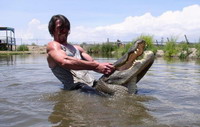Professional alligator wrestlers are dying breed
Wanted: Thrill-seeking animal lovers with cool heads and quick reflexes, who have finesse, agility and high tolerance for pain.

Alligator handlers across South Florida said there is simply less money, glamour and interest in the profession today then in its glory days, when crowds flocked to roadside shows to watch professional alligator wrestlers.
"I believe gator wrestlers are definitely a dying breed," said James Peacock, wildlife manager at Native Village in Hollywood. "We're fading out. Just like the cowboys and Indians of yesteryear, or the Japanese samurai."
While there are no exact figures, no one disputes that it is the wrestlers, not the gators, that are an endangered species.
On a good day, Peacock said he teaches a mere handful of tourists about Florida wildlife. Years ago, he said, those shows drew more than 400 visitors and he could make about $500 (368 EUR) a day in tips.
Today's tourists would rather ride on Everglades air boats and view wildlife in its natural habitat, said Nicki E. Grossman, president of the Greater Fort Lauderdale Convention and Visitors Bureau.
"You have to get real. You have to give someone an actual experience, a relationship with the destination," Grossman said. "And I think we've come a long way from the days when alligator wrestling was the big draw."
Daytona Beach resident Bobby Smith, who watched a show at the Everglades Alligator Farm with his family, said he had never seen the tourist staple until this summer even though he lives in Florida.
"I think they're just getting crowded out," Smith said.
Peacock said television shows and Internet videos about animals have had a big effect.
"The lessons are being taught in their own home, without harming any animals. So that's the positive side," Peacock said. "The negative side is, did I waste the last 17 years of my life learning how to do this?"
Jeremy Possman, 25, learned how to handle alligators from a member of the Miccosukee Indian tribe. He said some Miccosukee parents used to hope their children could handle the animals because a good show could secure wealth for the family.
"A long time ago, especially when the tourism of Florida was skyrocketing, most alligator handlers, they could pull a good amount of money in a week just off of tips," Possman said. "Nowadays, its not as good."
Injuries once were commonplace in the gator wrestling arenas, and sometimes were considered an asset.
"If you do get bit, a lot of times that just means more business," Possman said. "Because they're going to come back to see if it's going to happen again."
Former Seminole Indian tribal chairman and alligator wrestler James Billie lost a finger to an alligator, and still keeps the finger in a jar at his house.
Billie said the shows have died out along with the Indians' change in lifestyle.
"We don't have to hunt anymore," Billie said. "We eat bologna sandwiches like the rest of the world."
None of the talk of injuries or of declining interest fazes Scott Cohen, a gangly 13-year-old with floppy dark hair and a nagging desire to handle the animals. Scott is the head volunteer at Native Village and has been training as a wrestler by using smaller gators with taped mouths.
Scott said he hopes to someday open an animal park, and is fully committed to alligator wrestling whether the tourism market wants it or not.
"As long as I have all 10 fingers I'm good," he said. "As long as I have all my body parts, I'm fine."
Subscribe to Pravda.Ru Telegram channel, Facebook, RSS!





